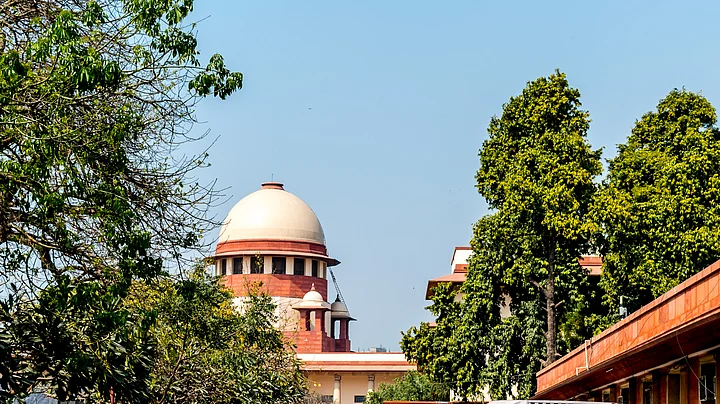The Supreme Court’s interventions in Delhi and Maharashtra on 11 May were criticised by many as a calibrated approach - a win in one case and a loss in another for the Government at the Centre. I have also written about it with the caveat that both Delhi and Maharashtra judgements show the Supreme Court’s federal resurrection.
Be that as it may, one thing is established now: after it passed an ordinance to undo the effect of the Supreme Court’s Delhi ruling, the Central Government has entrenched the red lines further. The message is loud and clear: it is not even willing to abide by the Court’s calibrated approach.
The Government of India’s ordinance to wrest back control over ‘services’ in the National Capital Territory of Delhi (Delhi) demonstrates its defiant approach toward the Supreme Court and the Constitution.
The ordinance is an executive coup of sorts with a message that the Centre does not want the Court to interfere in what it wants to control in the States and Union Territories (UTs). It also speaks volumes about the Government of India’s contemptuous approach toward the principles of the rule of law and democracy.
Onslaught of India’s Federal Principles: Who is to Blame?
A review of the last decade clearly shows that the States and UTs have faced the brunt equally; however, the incursions have been more egregious in the UTs, given the broader leverage they provide to the Centre in a federation with a centralising drift.
Discourses on the abrogation of Article 370 aside, the Centre’s dismemberment of the erstwhile State of Jammu & Kashmir (J&K) and degrading it into two UTs on 05 August 2019 best exemplify the Centre’s urge to control federal units directly. In the words of Pratap Bhanu Mehta, we are in ‘a full-blown constitutional crisis’.
There is more to the Centre’s passing of the Delhi ordinance to overturn the Supreme Court ruling in a matter of few days than meets the eye. This ordinance should not come as a surprise as the Centre has been getting away with what it wants in several important constitutional cases for years now. It is not just the onslaught of India’s federal principles that should worry us. Some of the pending matters before the Supreme Court are situated in total disregard for fundamental rights and the Constitution.
So, who is to be blamed? Is it only the Government at the Centre? Or have the Courts, the Supreme Court in particular, somehow allowed this legislative and executive overreach? Or, to put it in other words, how much has the Court really been able to do so far to check the abuse of power and authority by the legislature and executive at the Centre?
370, CAA, Electoral Bonds
To the utter dismay of those who only pinpoint the political executive for the constitutional crisis, the country’s constitutional courts have equally contributed to the erosion of regional autonomies and fundamental rights guaranteed under the Constitution.
Recall the number of occasions the Supreme Court has scuttled a legislative or an executive move of the Centre that impinged on constitutional principles. The Delhi power tussle itself is a standalone example of the inability of the Courts to check executive overreach. After a series of chequered rulings, it took years for the Supreme Court to finally settle the matter only for it to be reversed by an executive ordinance.
The Supreme Court has essentially maintained supreme silence in important constitutional cases pending before it. Rather than acting as a guardian against the state power, the Court appears to have turned a blind eye to the legislative and executive overreach of the state. The Court seems to have paved the way for the harms and injustices the state actions are premised on.
The Court’s inaction on the petitions challenging the abrogation of Article 370 and bifurcation of the State of Jammu & Kashmir, the Citizenship Amendment Act, 2019, and the electoral bonds scheme, among other things, best exemplifies the point. By not listing the cases for hearing, the Court ends up effectively favouring the Government. This results in a travesty of the rule of law and judicial review and an utter disregard for the Constitution.
The SC Reinforced State Power Time and Again
The Court’s interpretation of the bail provisions under the Unlawful Activities Prevention Act in National Investigation Agency vs Zahoor Ahmad Shah Watali makes bail very difficult. It held that ‘at the stage of considering bail, the court is not expected to elaborately examine or dissect the evidence but to record a finding on the basis of broad probabilities regarding the involvement of the accused’. This significantly deprioritises personal liberty.
Similarly, the judgement of the Supreme Court, in Vijay Madanlal Choudhary and Ors. vs Union of India, upholding a Kafkaesque law - the Prevention of Money Laundering Act - has been equally corrosive to personal liberty. The Court has exponentially armoured the state with opacity and total impunity by enabling it to not provide a copy of the Enforcement Case Report (similar to FIR) to the accused and also placing the burden of proving his innocence on the accused (as opposed to on the state which is the cardinal principle of criminal law).
What else does the state need?
The bottom line is that the Centre’s defiance toward the Court is merely a by-product of the latter’s own silence in important constitutional cases and a seemingly executive-minded approach in others. The Delhi ordinance must act as a wake-up call for the Court to uphold the Constitution and act as a guardian against the state power.
(Burhan Majid is an Assistant Professor of Law at the School of Law, Jamia Hamdard, and a doctoral fellow at NALSAR University of Law, Hyderabad. The Quint neither endorses nor is responsible for the same.)
(At The Quint, we question everything. Play an active role in shaping our journalism by becoming a member today.)
